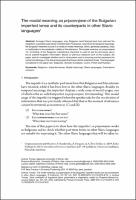Chapter The modal meaning za pripomnjane of the Bulgarian imperfect tense and its counterparts in other Slavic languages
Abstract
Amongst Slavic languages, only Bulgarian (and Macedonian) has retained the imperfect, a synthetic past tense inherited from Protoslavic. Apart from its temporal meanings, the Bulgarian imperfect occurs in a variety of modal meanings, which, generally speaking, imply a modification in the epistemic validity of the utterance. The modal meaning za propomnjane ‘for reminding’ of the Bulgarian imperfective imperfect is used to ask for previously given but at present forgotten information. Based on previous research work on the subject, the paper aims to investigate whether and to what extent such a meaning can be expressed by verbal morphology in the Slavic languages that have lost the imperfect tense. The languages considered in the paper are: Bulgarian, Serbian (Croatian), Czech, Polish and Russian.
Keywords
Bulgarian; Imperfect tense; Modal meanings; Slavic languages; Contrastive analysisDOI
10.36253/979-12-215-0216-9.16ISBN
9791221502169, 9791221502169Publisher
Firenze University PressPublisher website
https://www.fupress.com/Publication date and place
Florence, 2023Series
Biblioteca di Studi Slavistici, 54Classification
Linguistics
Literature: history and criticism


 Download
Download Web Shop
Web Shop